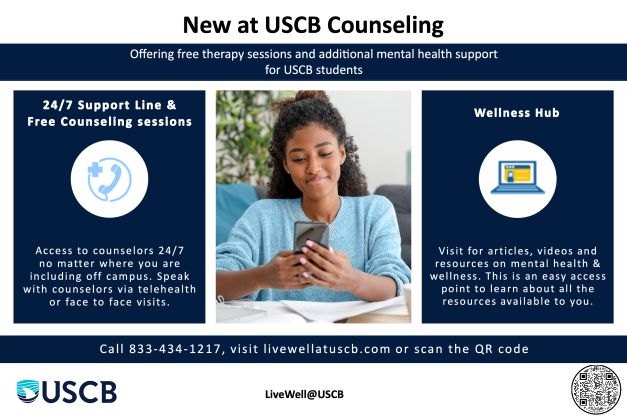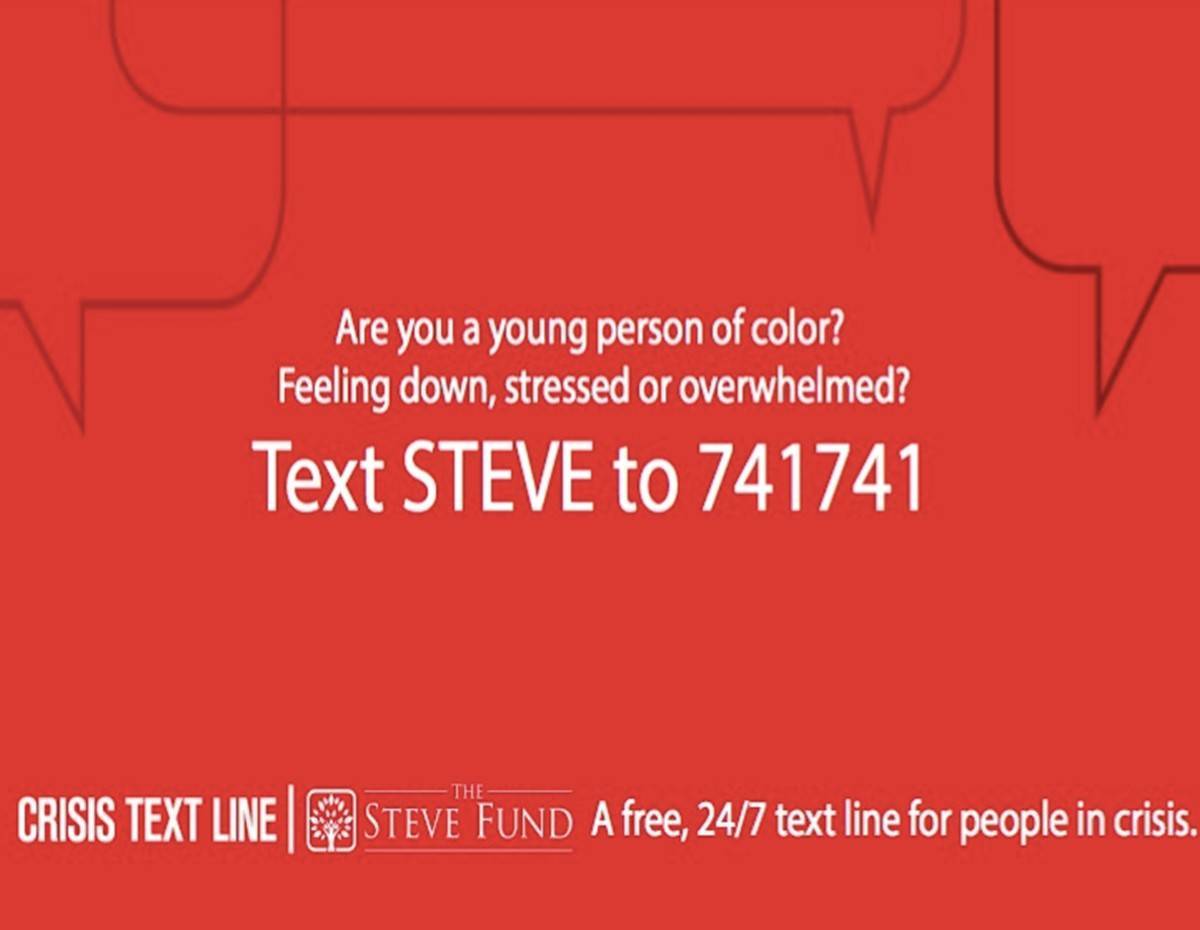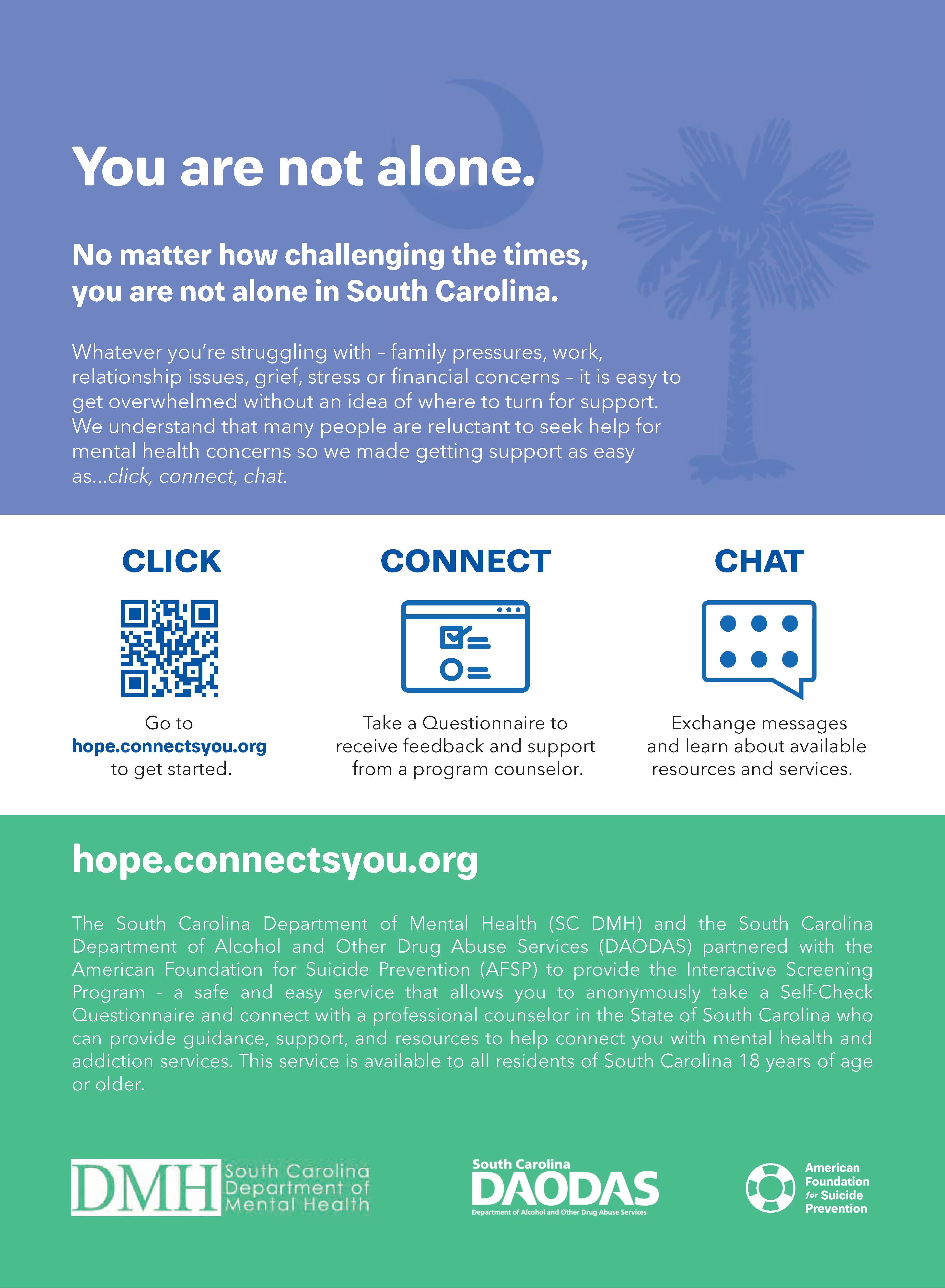Emergency Resources | Self-Help Resources | Drug and Alcohol Resources |
How to Help

Emergency Contacts and Local Resources
| University Emergency | (843) 208-8911 |
| Department of Public Safety | (843) 208-8912 |
| University Counselor (Weekdays 8:30 am – 5pm) | (843) 208-8375 |
| University Housing (Weekdays 8:30 am – 5pm) | (843) 208-8722 |
| Coastal Carolina Hospital - Local | (843) 784-8000 |
| Beaufort Memorial Hospital - Local | (843) 522-5269 |
| Hilton Head Regional Hospital - Local | (843) 681-6122 |
| Community Crisis Response & Intervention 24/7 - Local | (833) 364-2274 |
| Hopeful Horizons – (DV/Sexual Assault) - Local | (843) 770-1070 |
| National Suicide and Crisis Lifeline | 988 |
| National Sexual Assault Hotline | (800) 656-HOPE |



Areyou a young person of color? Feeling down, stressed or overwhelmed?
Text STEVE to 741741 and a live, trained, trained Crisis Counselor will receive the text and respond to you quickly to provide support. The volunteer Crisis Counselor will help you move from a hot moment to a cool moment. Learn more.
ULifeline supplements the services provided by college counseling centers. It combines an online screening tool as well as a mental health reference library. You can learn signs and symptoms and get expert advice. You can access the website with the following link:
Additional Resources
- Are you wondering what you are feeling right now? Do you feel wound-up tight, extra emotional, grumpy, overwhelmed, and/or angry. What we are feeling is grief and loss. Take the time to read this excellent article about what we are feeling and learn how to manage the emotions.
- Check out these 5 Mindfulness Exercises to help you refocus, relax and settle.
- Take a break from your online classes and try this Grounding with Your 5 Senses exercise.
- Adjusting your Study Habits for Online Learning - Check out this great resource to help you adjust your learning and study habits to fit online learning.
Drug and Alcohol Resources
- Beaufort County Alcohol and Drug Abuse Services provides individual and group counseling services and resources (also links to virtual local AA and NA
meetings)
https://www.beaufortcountysc.gov/alcohol-and-drug/index.html
https://www.beaufortcountysc.gov/alcohol-and-drug/coronavirus.html - South Carolina Alcoholics Anonymous: http://www.area62.org/
- SAMHSA’s National Helpline (aka the Treatment Referral Routing Service): 1-800-662-HELP
(4357) or TTY: 1-800-487-4889 is a confidential, free, 24/7/365 information service,
in English or Spanish, for individuals and family members facing mental and/or substance use disorders. This service provides
referrals to local treatment facilities, support groups and community-based organizations. Callers can also order free publications and other information:
https://www.samhsa.gov/find-help/national-helpline - Links to Addiction/Recovery Smartphone Apps: https://www.rehabs.com/smartphone-apps-for-recovery/ and https://www.addictionpolicy.org/connections-app
- NIDA (National Institute on Drug Abuse) COVID-19 Resources for People in Recovery/Addiction: https://www.drugabuse.gov/related-topics/covid-19-resources
- For information on USCB's biennial review of Alcohol and Drug Abuse Prevention programs, please contact Brandon J. Wright at wrightb@uscb.edu.
How to talk to Someone in Emotional Distress
Click here to view Emergency Contacts & Resources
Show you care, connect on a feeling level, listen
- “I’m concerned about you and noticed you haven’t been sleeping, eating, going to class, etc.”
- “How are you feeling?”
- Reflect back their feelings and paraphrase: “What I hear you saying is that you are in a great deal of pain and feel hopeless.”
- “I’m glad you called.”
- Listen with respect. Individuals in distress want understanding and care.
Ask about suicide directly
- “Sometimes when people feel sad, they have thoughts of killing themselves. Have you had such thoughts?”
- “Are you thinking of killing yourself?”
- “Have you considered suicide?” “How would you go about it?” “When would you do that?”
- Remember, asking about suicide does NOT put the idea in people’s minds.
Get help. Explore options. Offer resources.
- “What would help now?” ”Who can, who usually helps?” “How can I help?”
- Get assistance. Avoid trying to be the only lifeline for this person. Seek out resources even if it means breaking a confidence.
- “How would you feel about seeing the Campus counselor? Let’s call right now. I’ll walk over with you to see the counselor.”
Faculty & Staff Training for Supporting Students Mental Health
- Support Zone Training - There has been an increase in students experiencing mental health distress in college and oftentimes, faculty are the first to observe these behaviors. The Mental Health and Well-being Competency Certificate program is an initiative from Student Health and Well-Being with the goal of the helping faculty members feel better equipped to respond to the growing mental health needs of students.
- Safe Zone Training - A program that builds safe space across campus by visibly identifying students, staff and faculty who support the LGBTQ+ population. The program also offers educational and ongoing engagement opportunities for USC community members to explore and understand issues related to the LGBTQ+ community.

